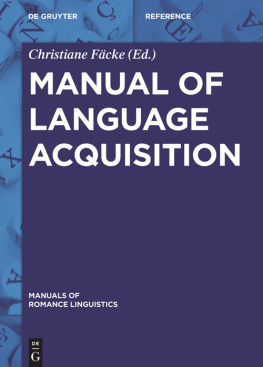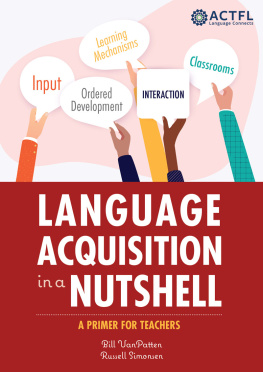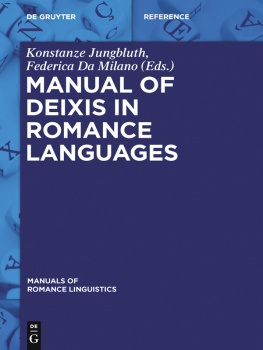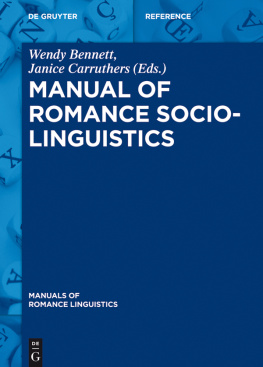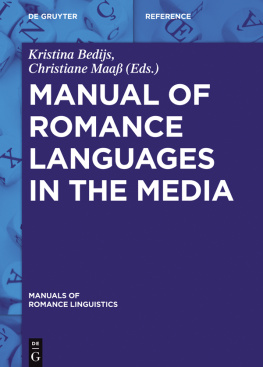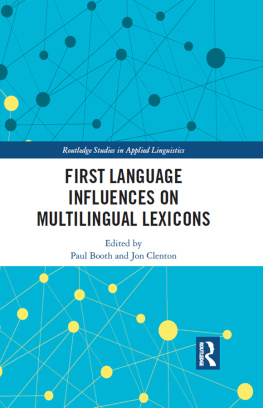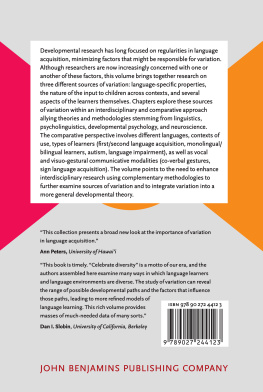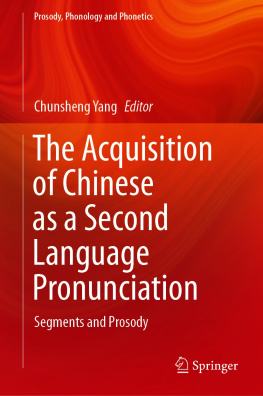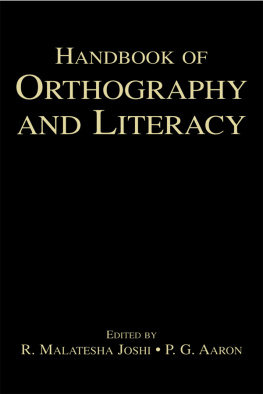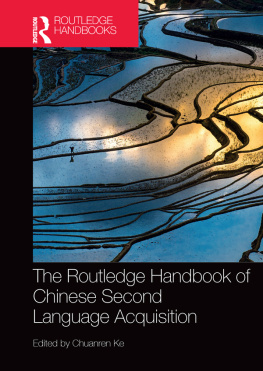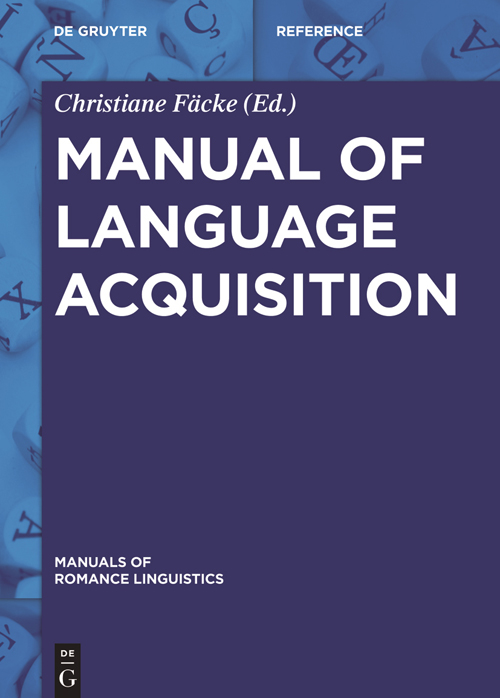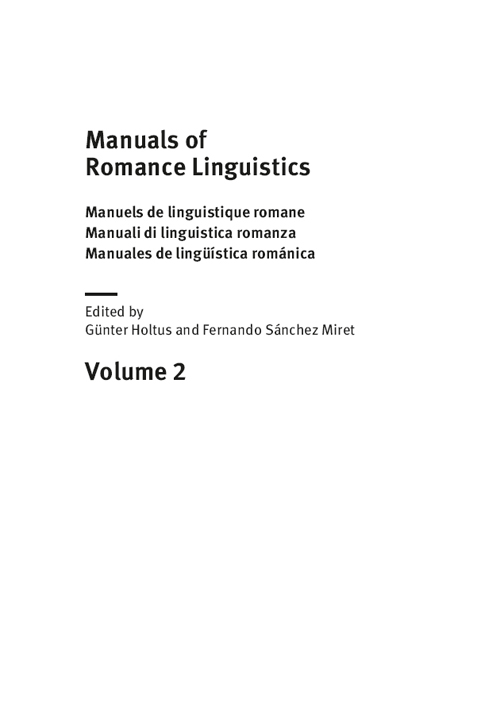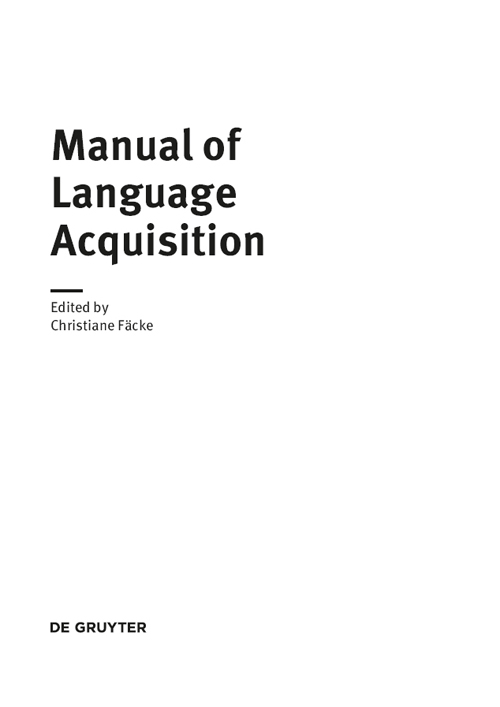A CIP catalog record for this book has been applied for at the Library of Congress.
The Deutsche Nationalbibliothek lists this publication in the Deutsche Nationalbibliografie; detailed bibliographic data are available in the Internet at http://dnb.dnb.de.
Manuals of Romance Linguistics
The new international handbook series Manuals of Romance Linguistics (MRL) will offer an extensive, systematic and state-of-the-art overview of linguistic research in the entire field of present-day Romance Studies.
MRL aims to update and expand the contents of the two major reference works available to date: Lexikon der Romanistischen Linguistik (LRL) (19882005, vol. 18) and Romanische Sprachgeschichte (RSG) (20032008, vol. 13). It will also seek to integrate new research trends as well as topics that have not yet been explored systematically.
Given that a complete revision of LRL and RSG would not be feasible, at least not in a sensible timeframe, the MRL editors have opted for a modular approach that is much more flexible:
The series will include approximately 60 volumes (each comprised of approx. 400600 pages and 1530 chapters). Each volume will focus on the most central aspects of its topic in a clear and structured manner. As a series, the volumes will cover the entire field of present-day Romance Linguistics, but they can also be used individually. Given that the work on individual MRL volumes will be nowhere near as time-consuming as that on a major reference work in the style of LRL , it will be much easier to take into account even the most recent trends and developments in linguistic research.
MRL s languages of publication are French, Spanish, Italian, English and, in exceptional cases, Portuguese. Each volume will consistently be written in only one of these languages. In each case, the choice of language will depend on the specific topic. English will be used for topics that are of more general relevance beyond the field of Romance Studies (for example Manual of Language Acquisition or Manual of Romance Languages in the Media ).
The focus of each volume will be either (1) on one specific language or (2) on one specific research field. Concerning volumes of the first type, each of the Romance languages including Romance-based creoles will be discussed in a separate volume. A particularly strong focus will be placed on the smaller languages ( linguae minores ) that other reference works have not treated extensively. MRL will comprise volumes on Friulian, Corsican, Galician, Vulgar Latin, among others, as well as a Manual of Judaeo-Romance Linguistics and Philology . Volumes of the second type will be devoted to the systematic presentation of all traditional and new fields of Romance Linguistics, with the research methods of Romance Linguistics being discussed in a separate volume. Dynamic new research fields and trends will yet again be of particular interest, because although they have become increasingly important in both research and teaching, older reference works have not dealt with them at all or touched upon them only tangentially. MRL will feature volumes dedicated to research fields such as Grammatical Interfaces, Youth Language Research, Urban Varieties, Computational Linguistics, Neurolinguistics, Sign Languages or Forensic Linguistics. Each volume will offer a structured and informative, easy-to-read overview of the history of research as well as of recent research trends.
We are delighted that internationally-renowned colleagues from a variety of Romance-speaking countries and beyond have agreed to collaborate on this series and take on the editorship of individual MRL volumes. Thanks to the expertise of the volume editors responsible for the concept and structure of their volumes, as well as for the selection of suitable authors, MRL will not only summarize the current state of knowledge in Romance Linguistics, but will also present much new information and recent research results.
As a whole, the MRL series will present a panorama of the discipline that is both extensive and up-to-date, providing interesting and relevant information and useful orientation for every reader, with detailed coverage of specific topics as well as general overviews of present-day Romance Linguistics. We believe that the series will offer a fresh, innovative approach, suited to adequately map the constant advancement of our discipline.
Gnter Holtus (Lohra/Gttingen)
Fernando Snchez Miret (Salamanca)
June 2014
Christiane Fcke
0 Introduction
Abstract: Language acquisition is related to different research discourses and contexts. A few of them are presented in the following introduction, for example definitions of key terms like second language acquisition and foreign language acquisition, or general research questions. Furthermore, the scope and outline focuses on the relevance of Romance languages in relation to English as a lingua franca, followed by an overview presenting short summaries of all the chapters in the book.
Keywords: research discourse, context, scope, outline, overview
1 Language Acquisition Research Discourses and Contexts
Using and acquiring one or more languages is part of human nature. We all speak at least our mother tongue (L1) and in addition many of us understand and/or speak a second language (L2) or various foreign languages. Language acquisition is strongly related to social, economic, geographical and historical conditions. For example, it makes a difference, of course, whether an individual grows up in a quadrilingual country like Luxembourg or in an officially monolingual nation like Germany. In the Grand Duchy, practising several languages and knowing foreign languages is part of life for the majority of the population, whereas in Germany, although the knowledge of foreign languages has a high reputation it is much less often put into practice. If we look at the United Kingdom, multilingualism or foreign language education seem to be even less valued. Sometimes, this disregard is accompanied by an awareness of English as a global lingua franca and of its usefulness in the context of globalization (cf. European Commission 2012).
Against this background, the scientific analysis of language acquisition proves to be an interesting field which has attracted special attention since the beginning of the 20th century. Behaviouristic approaches modelled language acquisition as a stimulus-response-pattern (i.e. Skinner 1974), whereas nativist positions (Chomsky 1959) found the origins of this giftedness inside man, supposing an innate language acquisition device (Chomsky 1997). Other theories and hypotheses focus on different facets of language acquisition, for example the interlanguage hypothesis (Selinker 1972), which underlines learner languages as necessary steps in the learners language acquisition process, or the processability theory (Pienemann 1998) which focuses on the ways in which L2 learners restructure their interlanguage knowledge systems, and states that the stage of development of learners influences their capabilities of restructuring their L2 knowledge systems.

